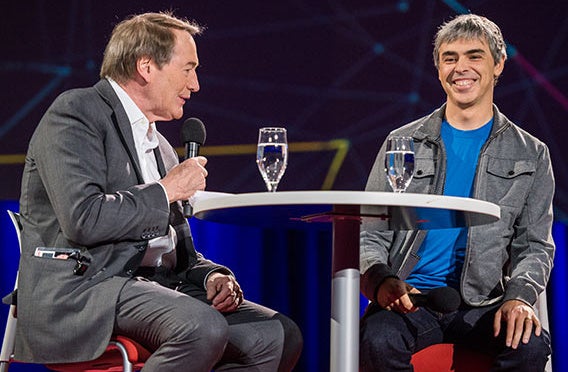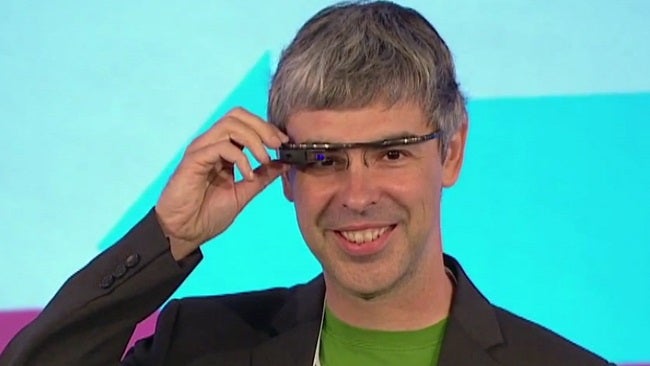Larry Page at TED: "felt guilty for wasting time" working on Android

Google is a company you know for moonshots like self-driving cars and balloons spreading out Internet, as well as for its futuristic ideas like Google Glass, and the one person who presides over all of this is Larry Page. The Google CEO spoke at TED2014 Vancouver, sharing his vision about the future of computing, his thoughts on the NSA, our personal information, and Android, of course.
In his talk, Page fiercely defended the need for revolutionary (not evolutionary) projects in the tech world and lambasted tech companies who are ready to settle once they hit their comfort zone. “Most people think companies are basically evil. They get a bad rap. And I think that’s somewhat correct,” Page said. “Companies are doing the same incremental thing that they did 50 years ago, 20 years ago. That’s not really what we need. Especially in technology, we need revolutionary change, not incremental change.”
This type of contextual knowledge is a priority for the search giant. It launched Google Now for Android smartphones using your phone’s contextual awareness, but that’s not its only step in that area. Google has recently acquired DeepMind, a company that taught computers how to play video games, while in-house, it’s teaching computers to recognize real-world creatures like cats (by letting computers analyze YouTube videos!). "It was really exciting, we have not been able to do this before. Imagine if that intelligence is thrown at your schedule," said Page.
At the same time, when asked about the shocking revelations around NSA’s eavesdropping programs, Page said he was frustrated with the agency’s secrecy on this.
"It is disappointing that the government secretly did this stuff and didn't tell us about it. It is not possible to have a democracy if we have to protect our users from the government. The government has done itself a tremendous disservice and we need to have a debate about it," he added.
"We are not thinking about the tremendous good that can come with sharing information with the right people in the right ways," Page said. "It could save 100,000 lives this year.”
Page himself suffers from partial voice cord paralysis that he has not been able to completely cure, and his experience here is first-hand. "I was scared to share but Sergey (Brin) encouraged me and we got thousands of people with similar conditions," he said. According to the CEO, this type of shared knowledge will accelerate the pace of curing various diseases.
And if you think of one such revolutionary change that has happened over the past few years, that’s clearly smartphones. Android is now the leading mobile operating system, having an overwhelming global market share, while iOS is trailing as a very distant runner-up. However, the situation was very different in the beginning, when Google acquired the small Android team around 2005. In the early days of Android, Page “felt guilty for wasting time” working on Android. Can you imagine that? Nowadays, of course, he openly admits his mistake: "That was stupid, it was the future.”
On the future of computing:
"The more I learn about technology, the more I realize I don't know."
The Google CEO also spoke about the future of computing in general, making a point that speech recognition and search has to improve hugely. "I was looking at search and trying to understand how to make computers less clunky and also thinking about how speech recognition is not very good," said Page. "We are still at the very early stages with search. Computers don't know where you are and what you are doing."This type of contextual knowledge is a priority for the search giant. It launched Google Now for Android smartphones using your phone’s contextual awareness, but that’s not its only step in that area. Google has recently acquired DeepMind, a company that taught computers how to play video games, while in-house, it’s teaching computers to recognize real-world creatures like cats (by letting computers analyze YouTube videos!). "It was really exciting, we have not been able to do this before. Imagine if that intelligence is thrown at your schedule," said Page.
On NSA eavesdropping:
At the same time, when asked about the shocking revelations around NSA’s eavesdropping programs, Page said he was frustrated with the agency’s secrecy on this.
"It is disappointing that the government secretly did this stuff and didn't tell us about it. It is not possible to have a democracy if we have to protect our users from the government. The government has done itself a tremendous disservice and we need to have a debate about it," he added.
On sharing your personal information:
"We are not thinking about the tremendous good that can come with sharing information"
Google, however, has taken a huge doze of criticism itself for using our personal data for a different goal - to sell ads. The recently growing negative sentiment about this practice has Larry Page worried that we as a society might miss a lot of the huge benefits that come with access to personal information.Page himself suffers from partial voice cord paralysis that he has not been able to completely cure, and his experience here is first-hand. "I was scared to share but Sergey (Brin) encouraged me and we got thousands of people with similar conditions," he said. According to the CEO, this type of shared knowledge will accelerate the pace of curing various diseases.
On moonshots:
Google's plan is to launch automated cars on roads by 2017
Finally, Larry Page also spoke about moonshots and how ideas like Google’s Loon or the self-driving car came to be. "It started when I was at college in Michigan. I was waiting for the bus and it was cold and snowing," he said, explaining how he got the inspiration for self-driving cars. Google has already built such a car, but it’s now improving it and working with regulators to get it on the road.Best of all, Page has now finally revealed an actual target date for the arrival of automated cars on our roads. Google's current plan is to launch the cars by 2017, a date that comes after 18 years developing the project.
Google Loon is another moonshot project that the company has unveiled, and Page is optimistic that it could bring the web to otherwise hard-to-reach areas.

All in all, Page’s ideas could once again be summarized in one simple sentence: "Most businesses fail because they miss the future," Page concludes, and we can only agree with this.










Things that are NOT allowed: